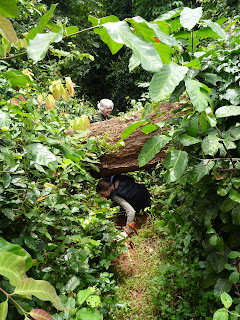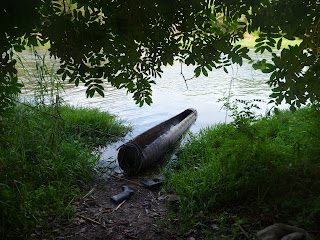Prepare yourselves, I’m not going to lie to you this may be long, rambling and let me warn you most likely not worth it! So good luck x
I am lying in bed trying to get to sleep while noises alternate between the strained acceleration of a Landcruiser, the racket of frogs competing for airtime and the wind whistling though the reed fences which sounds like women and children screaming. When I eventually get to sleep it makes for some interesting dreams I can tell you! So why the new bedtime noises? Well, we are house (and kitten) sitting for a month, which means we have cooked roast chicken and eaten food hot for the first time in four months; this really has been a treat – although a good BBQ with a variety of meat is still a craving.
We each sit next to a kerosene lamp for another night of low lit reading; work has had to be abandoned again as it is too hard writing in pretty much darkness. Fuel in Juba has become a BIG issue the last couple of weeks and hence we have spent more time without electricity than with. Thankfully we have generally been able to charge the computer at the hospital, but today even that failed, so we treated ourselves to a drink at a restaurant that had generator power. The lines for fuel are getting on for half a mile and a friend with a vehicle had to drive miles to find a station with fuel on Saturday. So perhaps us feeling frustrated that since we returned from holiday we lost the use of the car is not going to be such an issue very soon if no one can drive anyway! But seriously being without a car here has been a struggle. We are walking to work which is fine from the house we are in at the moment, but it means that after dark, there is no real safe way to be mobile. The motorbike taxi’s, which we are reluctant to use except for one guy we know who drives very carefully, stop work around eight o’clock and there are no regular taxi’s to speak of, so unless we are with someone who has a car it means ‘curfew’ at 8ish! It is an exciting life we are leading!!
 Heidi by her Kerosene Lamp.
Heidi by her Kerosene Lamp.So theatres, how are they? As we have said on an earlier post, well before we went on holiday they were all but closed except for emergencies because they were being re-tiled. When I heard this I asked the surgeon why? He couldn’t answer; the floors were actually pretty good. A cynical view I heard was that it was probably someone important’s relative that had some surplus tiles. So we waited for the tiling to finish, the speed of which is demonstrated that in one of the rooms when I went to check on progress there were only eight tiles left to lay. I returned two days later to see that room still hadn’t been finished! Finally theatres reopened, after a one week closure lasted a month.
For those of you who would like a technical update of things here goes: apologies for the jargon to everyone else. Anaesthetics are done by medical assistants who have been doing the job for varying lengths of time. Currently there are zero physician anaesthetists in Southern Sudan; except me that is. So there are three main theatres, one is used for minor procedures, generally done under local anaesthesia or nothing, this includes pulling wrists, plastering various broken bones and debriding wounds. The most disturbing I’ve seen is a 13 year old girl who had had an epileptic fit into her family fire. She had significant burns from the accident two weeks previously, which smelt awful and she was in so much pain it was terrible. She did get a bit of Ketamine but there were no intravenous pain killers in the hospital.... So as you might imagine various cries and screams often escape that room.
The other two theatres generally run at the same time and depending on the day will either be gynaecological cases or surgical cases. Until the orthopaedic surgeon arrived (he is here for one month) there was only one surgeon doing general, urology, orthopaedic, ENT and anything else that came along. He is trained as a urologist but works hard and tries to train his juniors despite being on his own. The anaesthetics will generally be Ketamine with some spinals. There is no long acting muscle relaxant so we give Suxamethonium (which is out of date but thankfully still works) boluses if required. There is a five litre oxygen concentrator with the option of nasal specs, but no standard face masks. The kit such as tubes, guedel’s, and face masks are woefully inadequate in variety and number (something else I am working on). However, there is a working saturation probe and blood pressure cuff in theatre which is now used on every patient – Hooray.
So I have been trying to get drugs, equipment, encourage more spinals and teach some peri- and post-operative thinking like giving antibiotics and analgesia which, granted, is at times impossible when you don’t have any but you can only do what you can do. So supervision has been the main thing, plus anaesthetising a few scarily small babies....
I hope this gives a bit of a feel for theatres and all from my kerosene light at 8.30pm! Now I will head to my bed for the chorus of noise; maybe the car sounds will have decreased tonight...
Oh, one last thing! So we thought house sitting would be easy, but the little eight week old kitten had other ideas! For the first week he was very excitable and ‘bitey’ and a little bit of a pain so we, well I actually, started a 10 minute timeout for him whenever he got too much for me, which of course wasn’t very often: you know how tolerant I am! I also decided that him getting up on the table to join in breakfast and dinner was no place for a kitten, so there has been a lot of lifting him on to the floor. James is very helpful in this exercise, not. I also read that clapping and shouting NO may stop the biting, but when at 7am I was doing this repeatedly James thought it maybe too much for the neighbours and put a prompt stop to it.... Then last Friday night we thought how cute he was being, curling up on our laps and being very chilled out. This continued on Saturday and then we realised he hadn’t eaten or drunk anything despite our efforts of ‘tasty’ food – oh dear. So followed a stressful few days building up until we got home from work and he couldn’t stand up – oh my goodness the cat is going to die on our watch what shall we do! The only vet we knew about was closed and so we decided to go in the morning and keep our fingers crossed overnight, plus a phone call to England to the owner to check the origin of the scamp – she was suitably reassuring and as a public health consultant pragmatic too. The next day thank goodness he was a bit better and has continued to improve and get stronger. Who knows what it was but he is well enough tonight to be play biting, charging me whilst I write and being generally ‘kitten-like’, I think the kerosene and torch light is confusing him with the shadowing and flickering. But if he bites me again it’ll be time for another ‘time-out’ shut in the other room.
 Freddie when ill - cuddling up to sleep.
Freddie when ill - cuddling up to sleep.OK done. Well done for those who got this far x
p.s. I almost forgot that damn monkey is back....








































